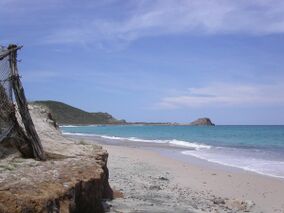Earth:Cabo Pulmo National Park
| Cabo Pulmo National Park | |
|---|---|
| Parque Nacional Cabo Pulmo | |
IUCN category II (national park) | |
 Beach at Cabo Pulmo | |
| Lua error in Module:Location_map at line 522: Unable to find the specified location map definition: "Module:Location map/data/Baja California Sur" does not exist. | |
| Location | Off Baja California Sur, Mexico |
| Nearest city | Cabo San Lucas |
| Coordinates | [ ⚑ ] : 23°26′00.7″N 109°25′28.3″W / 23.433528°N 109.424528°W |
| Area | 71.11 km2; 17,570 acres (7,111 ha) |
| Established | June 5, 1995 |
| Governing body | National Commission of Protected Natural Areas |
| Official name | Islands and Protected Areas of the Gulf of California |
| Type | Natural |
| Criteria | vii, ix, x |
| Designated | 2005 (29th session) |
| Reference no. | 1182 |
| Region | Latin America and the Caribbean |
| Official name | Parque Nacional Cabo Pulmo |
| Designated | 2 February 2008 |
| Reference no. | 1778[1] |
Cabo Pulmo National Park (Spanish: Parque Nacional Cabo Pulmo) is a national marine park on the east coast of Mexico's Baja California Peninsula, spanning the distance between Pulmo Point and Los Frailes Cape, approximately 100 kilometres (62 mi) north of Cabo San Lucas in the Gulf of California. Bahía Pulmo is home to the oldest of only three coral reefs on the west coast of North America. Estimated to be 20,000 years old, it is the northernmost coral reef in the eastern Pacific Ocean.[2][3]
The reef has a number of fingers of hard coral atop rock outcroppings that run parallel to the coast,[4] occurring in progressively deeper water offshore. The area was designated a national park in 1995, a UNESCO World Heritage Site in 2005, and a Ramsar Wetland of International Importance in 2008.
History
On June 5, 1995, Mexican President Ernesto Zedillo declared the 71.11-square-kilometre (27.46 sq mi) area surrounding Cabo Pulmo a federally protected National Marine Park. On May 2, 1997, Jose Luis Pepe Murrieta was the first volunteer Park Director appointed by the INE (National Ecological Institute). The non-profit organization Patronato Cabo del Este, founded in 1997, was (and still is) Cabo Pulmo's primary supporting organization while the federal government built a budget for the park. A community organization known as Amigos para la Conservación de Cabo Pulmo ("Friends for the Conservation of Cabo Pulmo", or ACCP) was founded in 2002 to promote conservation of the natural resources of the park.[5] Carlos Narro was appointed the first official Park Director by the National Commission of Protected Natural Areas (CONANP), a branch of the federal Secretariat of Environment and Natural Resources, in 2004.[6]
In 2005, Cabo Pulmo was inscribed on the UNESCO World Heritage List as part of a larger serial property known as the Islands and Protected Areas of the Gulf of California, in recognition of the Gulf's exceptionally rich biodiversity, high marine productivity, species endemism, and striking natural beauty.[7]
In his book The Log from the Sea of Cortez, American author John Steinbeck described Cabo Pulmo reef as follows:
- "The complexity of the life pattern on Pulmo Reef was even greater than at Cabo San Lucas. Clinging to the coral, growing on it, burrowing into it, was a teeming fauna. Every piece of the soft material broken off, skittered and pulsed with life, little crabs and worms and snails. One small piece of coral might conceal 30 or 40 species, and the colors on the reef were electric.”
Conservation
Before establishment of the park the area was heavily overfished. Creating the national park and policing it has been beneficial to the marine ecosystem. During the first decade of the 21st century, the area has seen an increase in total biomass of more than 400%. The increase is attributed to the healthy condition of the reef itself.[8]
References
- ↑ "Parque Nacional Cabo Pulmo". https://rsis.ramsar.org/ris/1778. Retrieved 25 April 2018.
- ↑ Cabo Pulmo Coral Reef in Danger | AIDA
- ↑ "Community structure of fishes in Cabo Pulmo Reef". Marine Ecology. ftp://ftp.cicese.mx/pub/divOC/ecologia_marina/leca/Referencias%20leca%202010.Data/PDF/Alvarez%20Filip%20et%20al%202006%20Cabo%20Pulmo%20fish%20community-2307835392/Alvarez%20Filip%20et%20al%202006%20Cabo%20Pulmo%20fish%20community.pdf. Retrieved 2012-02-09.
- ↑ "A framework to assess the health of rocky reefs linking geomorphology, community assemblage, and fish biomass". Ecological Indicators 52: 353–361. doi:10.1016/j.ecolind.2014.12.006. http://www.sciencedirect.com/science/article/pii/S1470160X14005743. Retrieved 2015-04-26.
- ↑ Welcome to Cabo Pulmo National Park
- ↑ Welcome to Cabo Pulmo National Marine Park
- ↑ UNESCO. "Decision : 29 COM 8B.9 – Nominations of Natural Properties to the World Heritage List (Islands and Protected Areas of the Gulf of California)". http://whc.unesco.org/en/decisions/472. Retrieved September 19, 2017.
- ↑ Ocean Bonanza at Cabo Pulmo
External links
- Cabo Pulmo Microsite from National Committee for Natural Protected Areas (CONANP) (Spanish)
- Photos of Cabo Pulmo Marine Park

